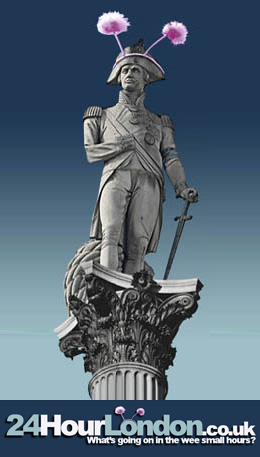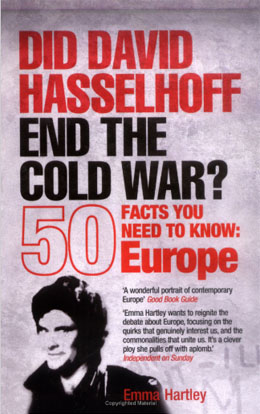Back in December the head of the culture, media and sport select committee, John Whittingdale MP, approached the BBC to inquire about the anonymous judges of the BBC folk awards. And got a briefing paper.
This month Ben Bradshaw, Labour MP for Exeter and a fellow member of the culture, media and sport select committee, did the same thing. Whereas Whittingdale got his briefing from Andrew Scadding, head of the BBC's public and corporate affairs, Bradshaw received a briefing from Bob Shennan, controller of Radio 2.
Here it is... though if you read Mr Whittingdale's, the similarities may strike you more than the differences.
"The BBC Radio 2 Folk
Awards celebrate outstanding achievements during the previous year within the
field of folk music. The nominees are
chosen by a voting Panel which is made up of approximately 190 people. The Panel is comprised of those persons who
have a professional or semi-professional interest in the folk industry, i.e.
folk festival and folk club organisers, journalists, presenters, record company
personnel, folk music academics, etc.
Folk Music is a small
music sub-genre. Although very few folk
artists are attached to major labels some do have record companies of
reasonable size, such as Proper, who have large budgets and a marketing team.
However, the vast majority of folk artists still run their own small labels and
are genuine cottage industries. There is no doubt that within the folk genre
there is a great professional boost for people who win a folk award, which
although perhaps small compared to a Brit Award or a Mercury win, it is
measurable. If the voting panel were published there would be an incentive for
the major and better off record companies to lobby the panellists to influence
their vote. This would disadvantage many of the smaller, self-releasing
nominees who could not afford the cost of this lobbying. Each year the BBC
Radio 2 Folk Awards throws up new names that would probably not get such an
opportunity if there were to be heavy lobbying from better off artists.
In its current form the
Folk Awards does present a genuine level playing field that could be
jeopardised if we change our voting system. The process used is in line with
other major award events such as the Brits and is regularly and rigorously
examined by BBC compliance and Editorial Policy.
The Awards are determined
by two rounds of voting by the wider Panel:
Round One: The Voting Panel are asked to nominate up to 3 artists
in each category. To avoid any possible
conflict of interest, panellists are not permitted to nominate artists with
whom they have a close professional interest.
Managers, agents, publicists or record company members of staff, are not
allowed to vote for any artist(s) that they represent.
Round Two: Each Panellist
can vote for one nomination in each category.
Panellists are not permitted to vote for artists with whom they have a
close professional interest. These votes
are counted by the BBC & Smooth Operations and the nominee with the most
votes in each category is declared the recipient of the award. Winners are announced on the night of the
Folk Awards. Spoiled voting papers (e.g. papers where more than one vote has
been cast or where the mark is not clear) will be discounted. Only the winner with the most votes is
recognised, and no other results are released (i.e. there are no runners up).In
the event of a tie, that is more than one artist receiving the same highest
number of votes, then the award will be made jointly to all the artists.
The top 5 ‘Best Albums’
nominated in round one are put to a public vote on Radio 2.
The Awards ‘Best Original
Song’ and ‘Best Traditional Track’ are awarded by a specialist Panel
The Panel comprises of people
with professional or semi-professional interest in the folk industry.
The Folk Awards Committee
nominates and oversees the panel.
The Specialist Panel for 2014
are:
Ian Anderson - Editor,
Roots Magazine
Bruce MacGregor -
Presenter, Travelling Folk (BBC Scotland)
Frank Hennessy – Presenter
Celtic Heartbeat (BBC Radio Wales)
Jon Lewis – Producer Radio
2 Folk Show – Smooth Operations
Karine Polwart – Musician,
Song Writer and Previous Award Winner
The Awards for ‘Lifetime
Achievement’, Good Tradition’, Lifetime contribution to songwriting’ and Roots
Award is determined by two rounds of voting by the Committee:-
The decision is taken at a
meeting scheduled towards the end of the 2013.
The Committee have an open discussion of these nominations with a view
to arriving at a consensus. In the event
of failure to reach a consensus, the award is decided by way of a vote. Smooth Operations will keep records of all
committee meetings.
The Young Folk Award is
determined by a separate panel of judges.
A shortlist of 10 acts is selected from all the entries submitted to the
Young Folk Award competition. These 10
acts are invited to a Performance weekend, which culminates in a performance
concert from which a specialist panel of judges, comprising musicians and
industry personnel, determine a winner.
Nominated Representatives
The BBC & Smooth
Operations appoint nominated representatives that are responsible for
monitoring the voting. They will ensure that votes are properly collected and
counted and that the process is conducted in line with the rules as well as the
BBC's Editorial Guidelines on Awards. Nominated Representatives are not
permitted to vote either as part of the Voting Panel or The Folk Awards Committee. Smooth Operations keep and store all
nomination and voting papers on behalf of the BBC for 3 years following each
award ceremony.
Nominated Representatives for
2014 are:
Louise Whitehead – Project Manager, Smooth
Operations
Fergus Dudley –
Editor, Editorial Standards BBC Radio 2, 6 Music & Asian Network
The Folk Awards Committee
consists of 5 people, 2 are members of the Folk Awards production staff, 2 are
senior members of BBC Radio 2 staff and the 1 is an independent expert.
The Folk Awards Committee
2014 are:
John Leonard – Managing Director,
Smooth Operations (Chair)
Kellie While – Head of
Programmes, Smooth Operations
Mark Simpson – Producer Bob Harris
Show, BBC Radio 2
Mark Ellen – Music
specialist
Al Booth – Specialist
Editor BBC Radio 2
Voting Panel - Terms and
Conditions
A copy of the ‘Panel
Declaration Form’ provided must be signed and returned along with the
nominated/voting form, failure to do so will render the nomination/vote
void. By returning a completed
nomination/voting form, panel members acknowledge that they are still eligible
to be part of the Panel and that they will abide by these rules.
Since its inception in
1999 the BBC Radio 2 Folk Awards has become a significant annual cultural
event. It has been responsible for introducing over 400 folk artists from grass
roots level, via the Horizon Award and more significantly via the Young Folk
Award, to main stream audiences.
This year alone, two of
the artists nominated for Folk Singer of the Year, Bella Hardy and Lucy Ward
first appeared on Radio 2 as finalists of the Young Folk Award.
Some of our past Horizon
Award winners are now listed amongst the most respected folk artists in the
world. Karine Polwart, who went on to win Folk Singer of the Year is one of
Scotland’s most prominent and respected singer songwriters. Cara Dillon, Julie
Fowlis (now co-presenter of the Folk Awards) Blair Dunlop and Kris Drever of
the band Lau, are all past Horizon Award winners.
We are very proud that
there is such a quantifiable and measureable positive effect on the careers of
artists such as these in a genre of music that does not often achieve the
mainstream attention it deserves. By looking back over the 15 years of the
Radio 2 Folk Awards we can see how many of our fledgling grass roots artists
have developed into internationally successful performers."
After receiving the briefing, Ben Bradshaw invited me to address Bob Shennan myself directly, which I have done. Here is the letter.
Dear Mr Shennan,
Ben Bradshaw MP has very kindly offered to pass this message to you on my behalf, in his role as a member of the government's culture, media and sport select committee, as I've been having some trouble wading through the BBC's bureaucracy, in particular the application to yourselves of the Freedom of Information act, which seems in my case to have resulted in the opposite.
He also forwarded the briefing you sent him about the BBC Radio 2 folk awards and its anonymous judges. He's a busy man, though, and therefore is possibly unaware of its similarity to the briefing sent to John Whittingdale MP - the chair of the CMS committee - by Andrew Scadding, head of the BBC's public and corporate affairs.
Also, the similarity that your briefing to him bore to remarks made by John Leonard back in 2011 on the same subject
In fact, the strong similarity that all of these sets of remarks bear to each other is quite surprising and makes me wonder whether they are not, in fact, the same set of remarks recycled?
The most surprising thing of all about this would be that the first time they were made, they were held up to ridicule in the British national media.
It's hard to imagine why any media organisation, especially a taxpayer funded one like the BBC, would batten down the hatches after that rather than considering the merit of the question: you would think that the organisation's instinct would be to do the opposite. In this instance, the question is "Who are the judges of the BBC Radio 2 folk awards"?
I came at this sideways. I thought it would make an interesting subject for my blog and at first there seemed to be no question of secrecy. I knew a judge, who agreed to do a background interview, Mike Harding, who at the time was the main folk DJ on Radio 2, said the names weren't a secret. But then it turned out they were. And it seemed at the time that they were only because John Leonard - owner of Smooth Operations, who the BBC pays to run the awards for them - said so. Read what he said for yourself.
I'm sure you're aware that the BBC has guidelines for running award ceremonies.
which include that "criteria for judging or nominations must be transparent, clear, fair and consistent".
Knowing who the judges are falls squarely under this guideline. Moreover I ask: what genuine interest does Radio 2 - or the BBC more widely - have in concealing this information?
The only argument that presents itself - and it has done on three separate occasion now, in John Leonard's off-the-cuff remarks, subsequently in the corporate briefing to John Whittingdale MP and now in your briefing for Ben Bradshaw MP - is that making the names public would result in attempts to influence the judges.
Shall we examine this idea for a moment?
Where else in British public life is this argument taken seriously? Is Radio 2 asking us to believe that if we knew who the judges were this would somehow place someone, somewhere at a disadvantage? How?
Surely this is analogous to arguing that if we knew who our MPs were we might try to influence their policies? Or that if we knew how our taxpayers' money were actually spent we might wish it to be done differently every once in while?
The only way one can meaningfully influence the outcome of an honest music judging process is by playing a judge some music. And yet this is exactly what these judges are supposed to be doing: listening to as much music as possible. To suggest otherwise is to suggest that the process is a stitch-up and that the judges should be restricting themselves in some way to a particular group of folk musicians, or music produced by a particular set of music producers. Surely this is not what is intended? Is it? It may be worth considering for a moment that the 190 judges are all somehow involved in the industry and the implications of that.
Conversely, if the fear is that the judges themselves are corruptible - that they could be bribed with a signed Seth Lakeman CD or a free felafel at a festival - then it is the job of the administrators to choose someone honest instead. Obviously with 190 judges at the last count, it is hard to know much about any of them... and surely that is another reason to throw some light on the situation? If Smooth Operations and the BBC do not have the time to keep track of these judges, why not let the rest of us have a go? Or have fewer and change them regularly.
Refusing to name the judges of the folk awards is, by a kind analysis, probably a time saving measure. Everyone involved in the awards' administration would rather not change the process: if it aint broke, don't fix it. And yet this argument is the essence of conservatism.
Folk music is the music of the people, who are not always best served by conservative attitudes. What the industry, its musicians and fans deserve is a transparent set of awards, rewarding the hard work and talent of the folk, roots and acoustic musicians of the British Isles and showcasing them internationally. This would go a long way to counterbalance the manufactured top-down nature of reality music shows like Britain's Got Talent, The Voice and The X Factor, that can lead young people to believe that the only route to success is to be picked from obscurity by a celebrity who will wave a magic wand and change their lives forever. Surely better to send the message that hard work, talent, good songwriting and touring are rewarded?
Some of this country's best exports are cultural. And yet the image we most often present of ourselves abroad - Downton Abbey, Brideshead, The King's Speech - is a very partial view of British society. I believe it is the job of the BBC to showcase the talents of British artists from all walks of life and that one of the ways this may be achieved is by better administering the BBC Radio 2 folk awards.
This year the date chosen by the BBC Radio 2 folk awards administrators for the ceremony was the same night as the Brits. Surely this, if nothing else, should have sent up a red flag somewhere in the BBC's compliance department that there was something awry with the conduct of these awards? What are the folk awards for, if not reaching an audience of music lovers - music lovers who were largely occupied elsewhere on that evening.
Naming the judges of the folk awards would go some way towards assuaging doubts that the BBC is serious about its commitment to this kind of music and that it would like the awards to be properly administered. Mr Shennan, I ask you to name the judges.
Thank you.
* If you'd like to receive posts from this blog directly into your Facebook newsfeed, you could *like* its Facebook page and then use the drop-down menu to indicate that it's one of your "interests". This will enhance the possibility that you'll get them. You could also follow me on Twitter at @emma1hartley





A glance at Bradshaw's political record seems to show that he's almost made a career out of ignoring the elephant in the room.
ReplyDeletePrivatization of the Health Service?
Can't afford healthy teeth?
War in Iraq?
Bradshaw: Keep Calm And Carry On.
Best Bitcoin Casino Site in Indonesia - ChoGiocasino
ReplyDeleteChoGiocasino offers the best Bitcoin Casino experience on the market, 바카라 and its great selection of games is made 메리트카지노 possible with 카지노사이트 the help of the operator. It